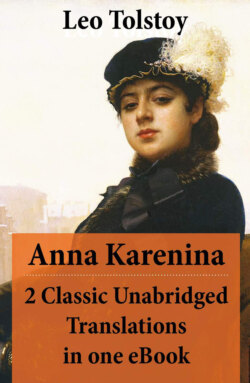Читать книгу Anna Karenina - 2 Classic Unabridged Translations in one eBook (Garnett and Maude translations) - Leo Tolstoy - Страница 110
На сайте Литреса книга снята с продажи.
ОглавлениеPART FOUR
TOC
Chapter 1
Chapter 2
Chapter 3
Chapter 4
Chapter 5
Chapter 6
Chapter 7
Chapter 8
Chapter 9
Chapter 10
Chapter 11
Chapter 12
Chapter 13
Chapter 14
Chapter 15
Chapter 16
Chapter 17
Chapter 18
Chapter 19
Chapter 20
Chapter 21
Chapter 22
Chapter 23
Chapter 1
THE Karenins, husband and wife, continued to live in the same house and to meet daily, but they were wholly estranged, Karenin made it a rule to see his wife every day, so as not to give the servants any grounds for making conjectures, but he avoided dining at home. Vronsky never came to the Karenins’ house, but Anna met him elsewhere and her husband knew it.
The situation was a torment to all three, and not one of them could have stood it for a single day but for the hope that it would change and that the whole matter was only a temporary, though painful, trial. Karenin expected the passion to pass, as everything passes; all would be forgotten and his name not dishonoured. Anna, who was responsible for the situation, and for whom among the three it was most painful bore it because she not only expected, but felt sure, that very soon everything would be settled and cleared up. She had not the least idea what would settle it, but was quite certain that it would now come very soon. Involuntarily submitting to her judgment, Vronsky too expected something, not dependent on him, to clear up all these difficulties.
In the middle of the winter he spent a very dull week. He had been chosen to act as guide to a foreign Prince, and was obliged to show him the sights of Petersburg. Vronsky had a distinguished appearance, possessed the art of carrying himself with respectful dignity, and was in the habit of associating with people of that class. That was why he was chosen to attend the Prince; but the task seemed a hard one to him. The Prince did not want to miss seeing anything about which he might be questioned at home and he also wanted to enjoy as many Russian amusements as possible; and Vronsky was obliged to accompany him in both cases. In the mornings they went sight-seeing, and in the evenings took part in the national amusements. The Prince enjoyed unusually good health even for a Prince, and by means of gymnastics and care of his body had developed his strength to such a degree that, in spite of the excess he indulged in when amusing himself, he looked as fresh as a big green shining cucumber. He had travelled a great deal, and considered that one of the chief advantages of the present convenient ways of communication was the easy access they afforded to national amusements. He had been to Spain, where he arranged serenades and became intimate with a Spanish woman who played the mandoline. In Switzerland he had shot a chamois, in England he had jumped hedges in a pink coat and shot two hundred pheasants for a bet. He had been in a harem in Turkey, ridden an elephant in India, and now in Russia he wanted a taste of distinctive Russian amusements.
Vronsky, who was, so to say, the Prince’s chief master of ceremonies, had great difficulty in organizing all the Russian amusements offered to the Prince by various people: trotting-races, pancakes, bear-hunting, and drives in three-horse sledges, gipsies, and Russian sprees with smashing of crockery. And the Prince imbibed the Russian spirit with the greatest ease, smashed trays full of crockery, made gipsy girls sit on his lap, and yet seemed to be always asking: ‘What next? Is this the whole of the Russian spirit?’
But, on the whole, of all the Russian amusements the Prince liked the French actresses, a ballet girl and white-seal champagne best. Vronsky was used to Princes, but whether it was that he himself had lately changed, or whether his intimacy with this Prince was too close, that week at any rate appeared very wearisome to him. All that week he felt like a man attending a lunatic and afraid for his own reason too. He was obliged to be on his guard the whole time not to deviate from the path of severe official respect, for fear of being insulted. The Prince’s manner toward the very people who, to Vronsky’s astonishment, were ready to go through fire and water to provide Russian amusements for him, was contemptuous. His opinion of Russian women, whom he wanted to study, more than once made Vronsky flush with indignation.
But the chief reason why the Prince’s presence oppressed Vronsky was that he saw himself reflected in the Prince, and what he saw in that mirror was not flattering to his vanity. The Prince was a very stupid, very healthy and very cleanly man — and nothing more. He was a gentleman, it is true, and Vronsky could not deny it. He was quiet and not cringing with those above him, free and simple with his equals, and contemptuously good-natured with his inferiors. Vronsky was the same, and considered it very meritorious to be so, but in his relations with the Prince he was the inferior and felt indignant with that condescendingly good-natured treatment.
‘Stupid ox! can I really be like that myself?’ he thought.
However this may have been, he parted from the Prince (who went on to Moscow) and received his thanks. Vronsky was very pleased to be rid of the embarrassing situation and the unpleasant mirror. He took leave of him at the railway station on the seventh day, on returning from a bear-hunt, after which there had been demonstrations of Russian ‘prowess’ all night.
